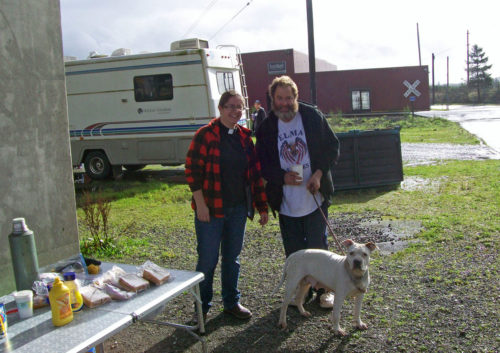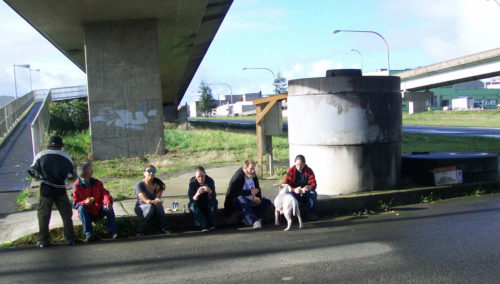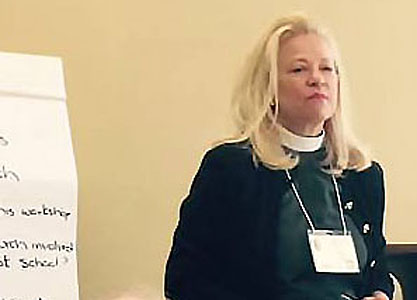Domestic-poverty fellows work to alleviate suffering, teach churchPosted Feb 26, 2015 |
|

Justin, shown here with his dog Trinity, plays an important part in the ministry with homeless people that the Rev. Sarah Monroe, left, coordinates out of St. Andrew’s Episcopal Church in Aberdeen, Washington. Photo: Glenn Stone
[Episcopal News Service] The Rev. Sarah Monroe and the Rev. Susan Heath may live on opposite ends of the United States, and their ministries may take different forms, but their goals are the same: building communities that can work toward alleviating poverty and the suffering it causes.
There is “a real hunger for community and a real hunger for hope” among the homeless people that Monroe ministers with and to in Aberdeen, Washington, she said.
“People who are poor in the U.S. are told in every possible way that they aren’t worth anything; that it’s their fault that they are poor, that they are a failure in life, that they are no good,” said Monroe of the Diocese of Olympia. She and Heath are the two recipients of one-year fellowships from the Domestic and Foreign Missionary Society. (The Domestic and Foreign Missionary Society is the legal and canonical name under which The Episcopal Church is incorporated, conducts business, and caries out mission.)
Monroe’s aim is to change that message and image, beginning with poor people themselves.
Meanwhile in the Diocese of Upper South Carolina, Heath is helping an ecumenical group of bishops lead an initiative to improve public education in the state.
Working for better educational opportunities “touches everything, and it’s about poverty because children in poverty have so many hurdles to get over,” said Heath, the other recipient of a one-year, $24,000 fellowship.
“It’s a moral issue because so much of what inhibits education everywhere, but certainly in South Carolina, is poverty. One of the opportunities I have is to pull back the curtain, prompting conversation about the haves and have-nots,” Heath said.
“Susan Heath and Sarah Monroe’s Mark 4 Fellowships focus on a central component of our faith: mutually transformative, person-to-person relationships with vulnerable communities,” said Jayce Hafner, domestic policy analyst in the Domestic and Foreign Missionary Society’s Office of Government Relations. Both Moore and Heath “seek to nurture a sense of empowerment and fellowship among those in need,” she added.
“These projects send forth a call to the rest of the church to engage in similarly transformational ministries and present a useful model that can be transferred to new geographical and cultural contexts,” she said.
Both Monroe and Heath have something to show the wider Episcopal Church, the Rev. Mark Stevenson, the Domestic and Foreign Missionary Society’s domestic poverty missioner, told ENS. The idea for the fellowships grew out of the Domestic and Foreign Missionary Society’s experience of seeing interns across the church working with specific local ministries, he said. Their work has also helped model best practices for the rest of the church.
“They’re teaching us how to reach out into the community” and use local partnerships to “turn the resources that you have at your disposal loose on attacking issues of economic injustice,” he said.
And the economic injustices run deep, Monroe and Heath each said.
When she was assigned as a deacon to St. Andrew’s Episcopal Church in Aberdeen, Monroe knew something about the region, having grown up in a rural area nearby. And she “absolutely fell in love with street ministry” during an internship with Ecclesia Ministries’ Common Cathedral in Boston while attending Episcopal Divinity School, in nearby Cambridge.
Aberdeen, a city of about 17,000 people some 100 miles southwest of Seattle, is a “stereotypical falling-down post-industrial town” with empty storefronts downtown and dependent on fluctuating timber and fishing industries. There’s a push “to make the town prettier by getting rid of the people on the street,” and those people ask, “Where are we supposed to go now?” Monroe said.

The Rev. Sarah Monroe, far right, began her ministry with homeless people in Aberdeen, Washington, by getting to know the folks who hang out under a bridge that connects two parts of the coastal town southwest of Seattle. Photo: Glenn Stone
That question, as well as “a real sense of anger and despair,” is what Monroe heard when she started seeking out homeless people in Aberdeen. Soon she was setting up a table under the bridge that connects two parts of town and handing out sandwiches to the people who hang out there. Over and over again, she heard they had nowhere to gather.
After being ordained a priest in April 2014, Monroe began using the St. Andrew’s parish hall for a Bible study and meal program for homeless people. It has become a gathering place where folks have begun to anchor their stories in the stories of the Bible. One day, the gathered group read the Magnificat. The participants had developed enough trust among themselves to begin telling of their experience of being poor and discovering that God does indeed care about the poor.
“It was the first time where I really saw this real sense of hope developing,” said Monroe, adding that she sensed participants began to feel “that somehow we’re a part of God’s plan and purpose.”
From that nascent sense of empowerment, Monroe said, she hopes that poor and homeless people can develop into leaders able to go to bodies such as the city council and advocate for their community.
“The purpose is not only to treat the symptoms of hunger and lack of resources but to really develop leadership in poor communities with the people on the street, people experiencing poverty, to develop a movement really to end poverty in this county and to develop a model to do it elsewhere,” Monroe said. “That’s a big dream, but it’s one worth having.”
That dream and the work it will take is something Monroe hopes to give to the rest of The Episcopal Church. “I hope that we’re developing something that can be used as a model for the wider church, and I hope that this conversation can become a wider conversation in the church about poverty and the realities of rural and small-town poverty, and what is the church called to do in that reality,” she said.
A video of Monroe explaining the work she plans to do during her fellowship year is here.
Developing models and prompting wider conversations are goals of the work Heath is doing in South Carolina. The roots of that work are in a 25-year-old collaboration among the bishops of the South Carolina Synod of the Evangelical Lutheran Church in America, The Episcopal Church in South Carolina, the Diocese of Upper South Carolina, the Roman Catholic Diocese of Charleston and the South Carolina Conference of the United Methodist Church.

The Rev. Susan Heath hopes the work of her fellowship year will involve people in South Carolina in developing “authentic and credible support of public education.” Photo: Diocese of Upper South Carolina
The current leaders of what is known as LARCUM decided to make improving public education and setting advocacy priorities for themselves and their members. Heath, who had worked in public-education advocacy previously and had “a little bit of name recognition beyond the church,” said she was a “likely suspect and a willing one” when the bishops asked her to coordinate their initiative.
The effort’s goals include involving many people from all four denominations in “authentic and credible support of public education,” Heath said. That involvement can range from organizing school-supplies drives to supporting the teaching profession, from tutoring to advocacy.
A second step is to have people “lend their voice to the conversation in political work,” Heath said. “We need to be able to contribute to making systemic changes. This is one place where we will put our energy.”
When Heath explains the program and its goals, she discovers that “folks who are skeptical of the church or who are non-churched are excited about it.” They tell her it is encouraging to see the churches doing something “that makes it clear the church is about more than self-perpetuation or bricks and mortar.”
Besides using the results of a LARCUM survey on current denominational work in support of public education, Heath is developing new efforts. A school district near where she lives has joined with other religious leaders to begin a pilot tutoring project in five elementary schools this month that will last until May. Along with tutoring students, the project will connect people of faith across denominations to form community among the tutors and school personnel.
“One of the things I hope to give to the rest of the church is the deep understanding – and this is something I think we all know but we underplay – of how much it matters when the community of faith steps up and is obvious in the conversation and in the equation,” Heath said.
A video of Heath explaining the work she plans during her fellowship is here.
The 2013-2015 budget passed by General Convention allotted $1 million for programs aimed at engaging Episcopalians in working for the eradication of domestic poverty (Line 108 here). That allocation, including $48,000 for the two domestic-poverty fellowships, is part of how the Domestic and Foreign Missionary Society is responding to the fourth Mark of Mission, which calls on members of the Anglican Communion to transform unjust structures of society, to challenge violence of every kind and to pursue peace and reconciliation.
The recently released Report to the Church details the budget-supported work of the Domestic and Foreign Missionary Society to date in the current triennium, including the Mark Four work described on pages 56-69.
General Convention structured the current triennial budget around the Communion’s Five Marks of Mission and provided significant unallocated sums for new work targeted around each Mark of Mission. The intention was that the resulting work would be done in new, collaborative partnerships with dioceses, congregations and other Episcopal organizations. The Domestic and Foreign Missionary Society has provided seed money and/or matching grants as well as staff support and expertise for the new work.
— The Rev. Mary Frances Schjonberg is an Episcopal News Service editor/reporter.

Social Menu